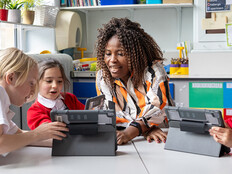Google Extends Digital Literacy Training to Teachers
Digital citizenship has stepped into the forefront of a modern-day education. Experts indicate that as schools roll out tech, they also need to be rolling out digital citizenship education.
Tech giant Google heeded that call and partnered with experts to launch Be Internet Awesome, an interactive campaign that educates students on how best to act on the internet.
One part of this Google campaign is Interland, a game that has students travel an imaginary world where they need to fight hackers, phishers, oversharers and bullies with digital citizenship skills. While game-based learning can be effective, educators also need to be armed with skills to teach their students to be citizens of the web.
This month, Google extended its Be Internet Awesome program to include a free online training course to help educators establish foundational skills needed to teach their students to have a safe and positive experience online.
“Teaching digital citizenship isn’t always straightforward — and can be pretty intimidating — given the many ways in which young people use the internet today,” reads the Google blog post announcing the Digital Citizenship and Safety Course.
The Google course is separated into five lessons:
- Internet safety and privacy, with a focus on setting strong passwords
- Mobile safety, with an emphasis on avoiding harmful downloads
- Informed searching, which is about evaluating credibility of online sources
- Scam safety, which establishes ground rules for avoiding phishing and other scams
- Online reputation management, which helps with long-term skills for protecting privacy
“We want to help ensure that today’s young people will become smart and responsible citizens both online and off,” reads the post. “But we also recognize that it’s important to partner with educators too, so we really look forward to seeing how the Digital Citizenship and Safety Course will help teachers tackle this important topic in the classroom.”
SIGN UP: Get more news from the EdTech newsletter in your inbox every two weeks!
Best Practices for Teaching Digital Citizenship Skills
As schools roll out one-to-one technologies and establish BYOD programs, teaching students how to navigate the web safely is fundamental.
“It’s part of our everyday curriculum. Our technology standards cover everything from how to use a keyboard to how students can keep themselves and their information private online,” says Melissa Miller, technology coordinator at Bremen (Ind.) Public Schools, in an EdTech article.
Allison Renda, a teacher at Broadalbin-Perth Intermediate School in Amsterdam, N.Y., also tells EdTech that when she teaches her students how to use classroom devices she starts with lessons on online behavior.
“At the beginning of the year, every class writes a digital citizenship pledge — what they pledge to do this year to make themselves better citizens online,” she says in the article.
With this new Google training, even more educators will be equipped to weave in lessons on digital citizenship into their curriculum.









